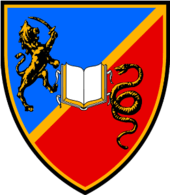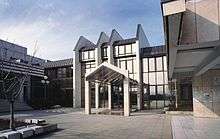University of Kragujevac Faculty of Economics
|
Економски факултет Универзитета у Крагујевцу | |
 | |
| Type | Public |
|---|---|
| Established | 1 October 1960 |
| Dean | Petar Veselinović |
Academic staff | 69 (2013)[1] |
Administrative staff | 41 (2013)[1] |
| Students | around 3,600 |
| Undergraduates | around 3,450 |
| Postgraduates | around 130 |
| around 15 | |
| Location | Kragujevac, Serbia |
| Campus | Urban |
| Colors | Golden brown, Blue, Red |
| Affiliations | University of Kragujevac |
| Sports | Futsal Club "Ekonomac" |
| Website | www.ekfak.kg.ac.rs |
The Faculty of Economics at the University of Kragujevac is an educational and scientific institution in the city of Kragujevac. It was established as a department of the University of Belgrade Faculty of Economics on 1 October 1960, and became an independent higher education institution on 16 December 1975. Since its establishment the Faculty has strived at creating an important position in the country and the region by educating economists, managers, and also through encouraging scientific work of its staff who conducted their research projects in the field of fundamental and applied research. With this aim, curricula have been improved in order for them to be aligned to the latest scientific and educational trends of the contemporary world. In 2009, The Faculty of Economics fulfilled all the requirements of the new Serbian Law on Education and became a fully accredited higher education institution. All three levels of study are accredited: undergraduate, graduate and PhD.
The Faculty of Economics employs about 80 teachers and associates. Up to now, around 9,200 students have graduated from the Faculty, 133 have continued their studies successfully advancing to the Magisterium degree, around 420 acquired the Masters degree, and 80 acquired the PhD degree.[2] The Faculty of Economics is organized through five departments - General Economics; Management and Business Economics; Accounting, Auditing and Business Finance; Finance, Finance Institutions and Insurance; Statistics and Informatics. There are also three centers - Center for Economic Research, Center for Publishing, and Center for Lifelong Learning, Student Counseling and Career Development.
Degree Programs

Important incentive to economic studies in Serbia reorganization was given by two TEMPUS Projects, both of which were led by Faculty of Economics of University of Kragujevac. First TEMPUS was focused on reorganization of study of economics in Serbia, and second TEMPUS was focused on graduate studies in Serbia reorganization.
Undergraduate program
The curriculum of undergraduate studies at the Faculty comprises six courses:
- General Economics,
- Finance, Financial markets and Banking,
- Accounting and Corporate Finance,
- Marketing,
- Management,
- Tourism and Hotel Industry Management.
Duration of undergraduate studies for all six courses is four years. For the admission on undergraduate studies can apply students that have successfully finished four year middle or high school. Prospective candidates for admission then have to pass admissions exams in 2 subjects of their choice. Candidates can choose among following eight subjects: General economics, Business economics, National economics, Statistics, Accounting, Philosophy, Sociology and Mathematics.
Graduate program
The curriculum of graduate studies at the Faculty comprises seven courses:
- General Economics,
- Finance, Financial markets and Banking,
- Accounting and Corporate Finance,
- Marketing,
- International Management,
- Tourism management,
- Electronic Business.
For the admission on graduate studies can apply candidates that have successfully finished undergraduate studies and acquired at least 240 ECTS (European Credit Transfer and Accumulation System) points. Candidates that have graduated from economics, business or management faculties (colleges) are ranked only according to their success on undergraduate studies. Candidates that have graduate from other faculties have to pass two admission exams and are ranked according to their success on undergraduate studies and admission exam. Admissions exams that they have to pass depend on the graduate program they are interested in.
PhD Program
The curriculum of PhD studies at the Faculty comprises three courses:
- Macroeconomics,
- Business Management,
- Accounting and Business Finance.
Campus and Facilities
Since 1981, The Faculty of Economics uses a 7,570 square meter building (net useful area) containing well equipped classrooms, an amphitheater with 520 chairs, computer labs, a library, a book store, a student restaurant, student services, a post office, administrative offices, and offices for professors.[3]
The library at the Faculty of Economics includes about 50,000 volumes that cover domestic and foreign books, scientific monographs, primary and reference publications, manuals, domestic and foreign periodicals, Master theses, doctoral dissertations, specialist papers and student term papers. The Faculty is subscribed to 62 domestic and 25 foreign scientific magazines. The Library also has a reading room accommodating 150 students. Book store sells publications of the Faculty of Economics.
Three computer rooms for Bachelor studies can accommodate around 100 students, and are used for classes in courses of E-Business, Information Systems, Information Technology, Operation Management etc. They can also be used by students after the classes, especially if they need to read publications available at the Academic Internet Network. Faculty also has two computer rooms for Master and PhD students which can accommodate about 60 students, a classroom of the Center for Lifelong Learning, a video-conferencing room, as well as the student restaurant which can be used by students and teachers.
Cooperation
The Faculty has a highly developed co-operation with a large number of foreign universities and institutes. Among these institutions most notable are:
- University of Udine - Italy,
- University of Maribor - Slovenia,
- Cracow University of Economics - Poland,
- University for Information Technology and Management, Rzeszow - Poland,
- Modrzewski Kraków University College, Cracow - Poland,
- Comenius University from Bratislava – Slovakia,
- University of National and World Economy in Sophia - Bulgaria,
- University of Macedonia, Thesaloniki – Greece.
Numerous Faculty teachers and associates are engaged by domestic institutes, faculties, consultant companies, and other clients, so contributing to their reputation and strengthening professional basis of the work they perform. Moreover, some of our professors are individually involved in important international projects confirming their personal reputation as well as that of the whole Faculty.
Notable Alumni and teaching staff
- Professor Veroljub Dugalić, General Secretary of the Association of Serbian Banks (2003-present), Minister of Finance of the Federal Republic of Yugoslavia (2002-2003), President of the Management Board of the Belgrade Stock Exchange (2003-2009),
- Professor Živadin Stefanović, Vice President of the Serbian Government (1989-1991)
- Rajko Ubiparip, Minister of Economy, Energy and Mining of Republika Srpska (2006-2008)
- Nebojša Divljan, Chairman of the board and CEO of Delta Insurance and Delta Generali Insurance (1998-2011)
- Mateja Mijatović, Mayor of Raška District (2007-2014)
- Vladimir Jovanovic, Mayor of Prokuplje (2004-2008) and Deputy in Serbian Parliament (2012-2014)
- Miroslav Mišković, founder and owner of Delta Holding
- Zoran Todosijević, City of Cacak Secretary for Finance (1998-present)
- Miloslav Samardžić, writer and editor of magazine "Pogledi"
Sport
Futsal club “KMF Ekonomac Kragujevac” was founded by Professor Veroljub Dugalic, several teaching assistants and a group of Faculty of Economics students on 7 November 2000. Following year, club has brought several new players and advanced to qualifications for Serbian national professional league. In 2004-05 club was third, in 2006-07 second and in 2007-08 first in Serbian national league. In 2008 club also won Balkan Cup. In the last eight seasons (2009/10, 2010/11, 2011/12, 2012/13, 2013/14, 2014/15, 2015/16 and 2016/17), Ekonomac was the champion of Serbia (first in Serbian national league). Ekonomac also won Serbian cup in 2013, 2014, 2017 and 2018.[4]
References
- 1 2 "Informator o radu" (PDF). ekfak.kg.ac.rs (in Serbian). p. 17. Retrieved 31 March 2014.
- ↑ "Faculty of Economics in Kragujevac". Faculty of Economics in Kragujevac. Retrieved 15 January 2016.
- ↑ "About Faculty of Economics". Faculty of Economics in Kragujevac. Retrieved 15 January 2016.
- ↑ "KMF Ekonomac". KMF Ekonomac. Retrieved 15 January 2016.
